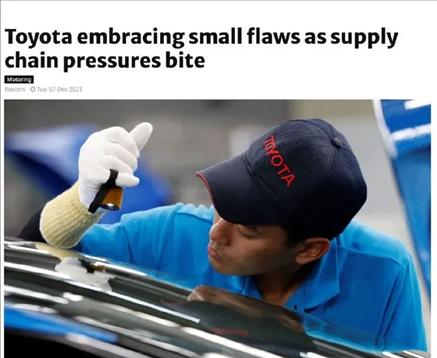Since Toyota announced that it would build a car from defective parts, there have been many voices on the Internet.
"I can't believe that Toyota, which has always pursued perfection, would make such a decision";
"Building a car with defective parts will undoubtedly greatly reduce the quality";
"The lack of core makes toyota too difficult, which may be a temporary transition plan";
"The use of defective parts may have been around for a long time, but this time I chose to disclose them."
Indeed, from the moment Toyota chose to openly use defective parts to build a car, the image of Toyota as the supreme in the minds of many consumers began to waver. So will This move by Toyota become the beginning of car companies to follow suit? Should consumers buy cars made of "defective parts"?

01.
Counterfeit products build cars, leaving the decision to consumers?
A set of real research data feedback from the car quality network shows that 48.2% of people strongly oppose the use of defective parts to build cars, believing that this is contempt for product quality. 30.1% of people believe that it is necessary to explicitly indicate in the defective parts and components products, and the consumer decides whether to buy; 13.3% believe that there will be quality and safety risks when defective parts and components enter the market. Only 8.4% of people believe that they do not oppose the construction of defective parts, but the price of the car should be reduced.
What does it mean that defective parts that used to be treated as scrapped are now being reactivated? The lack of core of the epidemic has brought too much damage to Toyota to make this decision.
Toyota announced on December 20 that it will suspend the operation of seven production lines at five plants in Japan in January 2022. Procurement of semiconductors and other parts has stalled, reducing production by about 20,000 units from the latest plan.
According to Toyota's November production and sales data, global production in November was 965455 units, up 2.8% year-on-year, achieving positive growth for the first time in four months. Toyota's production was 821329 units, down 0.8% year-on-year, the fourth consecutive month of decline. It can be said that "the fall is endless".
The pressure brought by the lack of core forced Toyota to use defective parts to build a car, which is understandable. But at present, the entire industry is fighting against the lack of cores and waiting for the grand situation of the car market to pick up. As a big brother who has been living in the automotive industry for a long time, Toyota's approach will undoubtedly force consumers to pay for it.
02.
The inflow into the market will continue to stir the sensitive nerves of consumers
According to a complaint data from the car quality network, the number of complaints about quality problems in the first 11 months of 2021 reached 72,000, an increase of 4.4% over last year. And on the simple quality of complaints, the past five years have shown an increasing trend.
Practical products can reassure consumers. For the purchase of a car, the purpose of consumers is very clear, and it needs to be used to buy. For the use of cars, involving mechanical and technical problems, most consumers are half-aware, not to mention that the car problem can be solved very well. In the after-sales service, consumers are vulnerable. Presumably, this is one of the reasons for the increase in complaints over the years.
And it is precisely because many consumers have a blind spot in automobile knowledge that they are used by car companies. Toyota once said when it claimed that it was easy to see parts, including the appearance of the car, but other things, unless everyone looked at it very carefully, it was difficult to detect.
In other words, the construction of defective parts does not eliminate problems such as quality hazards in the future use of the car. If these components are used in the core hardware of the engine, transmission, brake system, electronic control, etc., causing serious safety accidents, who can be responsible? It is only consumers who pay for it, but also risk their lives.
On the other hand, it does not help to eliminate the problem of quality complaints, but leads to a vicious circle. The use of defective parts is a good way to reduce the cost of supply at present, and the future maintenance costs of car companies will certainly be quite large.
03.
Toyota took the lead in trying melons, and the follow-up will not be less?
In the absence of core environment, car companies also use all their strength to cope. For example, Weilai delayed the delivery of the car, Xiaopeng, ideal first reduced and then reloaded, and so on. Although Toyota's approach optimizes costs and improves revenues, it does not play a good exemplary role in the market. Because this may become the new "unspoken rule" of the entire automotive industry, so that other companies will follow suit.
The safety bottom line must be adhered to. The use of defective parts to build cars may trigger a brand trust crisis in the days to come. Moreover, the long-term durability of the car made of defective parts, the quality assurance situation, and the retention rate need to be answered one by one by car companies in front of the market.
The current tense supply and demand relationship makes car companies fall into car manufacturing anxiety, for car companies, shoddy charging is not a long-term solution, for consumers, quality discounted products should be treated with more caution. Therefore, do you have the answer in mind whether to buy a car made of defective parts?
Treating consumers sincerely is where the vitality of the brand lies.